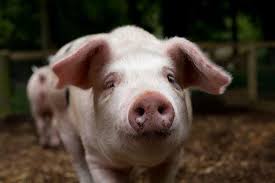Mizoram’s pig farming industry continues to suffer amid a prolonged African Swine Fever (ASF) outbreak that has led to the deaths of over 38,000 pigs across the state. Since the outbreak began more than eight months ago, over 14,310 pigs have succumbed to ASF, while 23,720 more have been culled in efforts to contain the highly contagious disease, according to the Mizoram Animal Husbandry and Veterinary (AHV) Department.
While the ASF remains active in parts of Mizoram, there are signs of a slowing outbreak, as daily reported deaths and cullings have significantly decreased in recent days. “It’s encouraging that the intensity of pig deaths has reduced. On Monday, for instance, only 52 pigs died and 26 were culled in various districts,” an AHV Department official told IANS, noting that at the peak of the outbreak, the daily death toll was substantially higher.
Experts suggest that ASF outbreaks in Mizoram tend to intensify with the arrival of pre-monsoon rains and warmer temperatures, conditions that may facilitate virus transmission. The winter months, however, often see a natural decline in the disease’s spread, which may partially explain the current reduction in ASF cases. Despite the recent downturn, the virus has yet to be eradicated and remains active in several areas of the state.
Enormous Economic Impact on Farmers
The ASF outbreak has exacted a heavy toll on pig farmers across six of Mizoram’s 11 districts, resulting in estimated economic losses of around ₹190 crore in 2024 alone. This adds to the cumulative losses of approximately ₹850 crore that pig farmers have incurred since ASF first struck Mizoram in 2021. The state’s AHV Department reports that over 33,420 pigs and piglets were lost to ASF in 2021, with another 12,800 and 1,040 dying in 2022 and 2023, respectively.
Mizoram’s government has sought central assistance and provided state-funded compensation to hundreds of families to help offset the economic impact. However, with pork being a staple food in Mizoram and demand strong across the entire northeastern region, losses continue to be felt throughout the local economy. Pork consumption has fueled an industry worth an estimated ₹8,000 to ₹10,000 crore annually in the northeast, with Mizoram’s farmers playing a significant role in the supply chain.
Preventive Measures and Future Concerns
In compliance with national guidelines, the AHV Department has declared numerous villages in affected districts as infected zones under the Prevention and Control of Infectious and Contagious Disease in Animals Act, 2009. To prevent further transmission, the department has halted the transport of pigs, piglets, and pork from these zones to ASF-free areas and has banned imports of pigs from neighboring states and countries with reported ASF cases, including Myanmar and Bangladesh.
The ASF virus, which poses no health risks to humans but has a high mortality rate among pigs, is suspected to have entered Mizoram through livestock traded from bordering areas, including Myanmar and Bangladesh, with which Mizoram shares extensive unfenced borders. Mizoram’s government and farmers remain vigilant as they continue efforts to contain the virus.
As the state anticipates the arrival of winter, hopes are high that the seasonal decrease in ASF-related deaths will persist. However, Mizoram remains cautious, as the annual reappearance of ASF since its initial detection in 2021 underscores the continued threat of this devastating disease to the state’s pig farming industry and economy.











